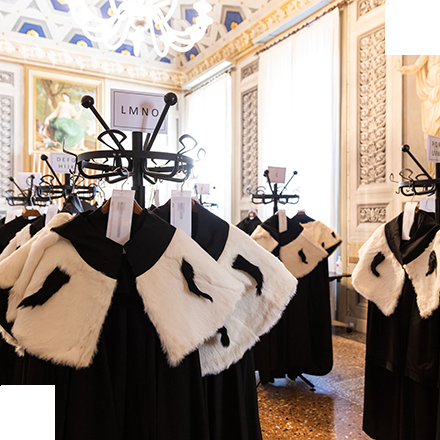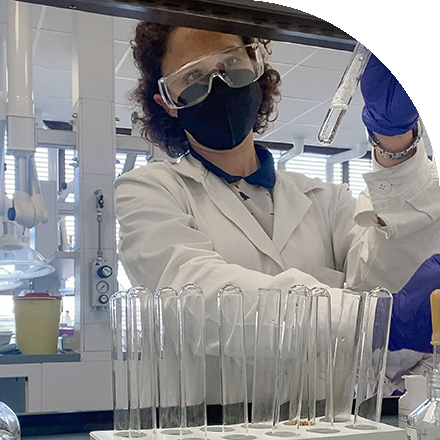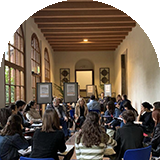Università Cattolica del Sacro Cuore Largo A. Gemelli, 1 - 20123 Milan
Chiara Bidoli
Chiara Bidoli, director of the children's magazines of the RCS MediaGroup, has never lost her connection with the university where she graduated in Literature. In the cloisters he found an engine for his curiosity and to choose to devote himself to service journalism. In September she became the first director of the RCS MediaGroup chosen by Urbano Cairo, in particular of the quimamme.it website and of the magazines Io e il mio Bambino and Insieme.
Dr. Bidoli, when did you realize that your professional career could be placed in the world of information?
I started university in the belief that art would be my path: in reality, we often approach studies imagining a path, without then being sure of where we are going. With this in mind, Università Cattolica offers you the opportunity to participate in and attend numerous meetings, conferences and workshops that stimulate new interests, curiosities and food for thought.
In fact, during my years of study I had become passionate about cinema, thanks to some very good professors, but it was by working that I began to understand what I would have liked to do in life.
Did university give you the opportunity to get in touch with the world of work?
I am very grateful to Università Cattolica, and this is one of the reasons. During my degree course, I won an internal competition to work at Vita & Pensiero (the University's publishing house), which actually became my first publisher. It was the period in which the book files began to be computerized, and I was in charge of the database. Putting myself out there, confronting people, was my first step towards evolving from the shy girl I was. Later, I happened to write for some newspapers of Sfera Editore, which then joined the RCS group.
So you had already started working full-time during your years of study at university?
Exactly, and I advise everyone not to arrive at the thesis without entries on the resume, without work experience. Against the advice of my father, who urged me to complete my academic course, I accepted the contract that had been offered to me, facilitated by the fact that I had no obligation to attend. Obviously, I had a small delay with my graduation, but the great availability of the professors allowed me to present my thesis without too many vicissitudes: and this is far from obvious.
Is there any professor you remember in particular?
Università Cattolica is a place where you can meet many people, in Largo Gemelli a deep-rooted sense of belonging is created. I remember in particular two professors, to whom I am particularly attached, both in the field of cinema. One is Francesco Casetti, an extremely demanding professor but also a charismatic catalyst. I respected him and grasped the immense value of his lessons: as a girl who approached exams with anxiety and panic, it was precisely a very high grade in one of his papers that began to increase my self-esteem. The second is Mariagrazia Fanchi, to whom I am still very attached. It was in her that I found immense availability in my thesis work, despite being a working student: and for this I will always be grateful.
What does it mean to be a journalist who deals specifically with issues such as family, motherhood and health?
I realized that I was interested in these topics in my first report on the inauguration of the neonatology department at the Mangiagalli Clinic. It's often thought of as second-class journalism, but I love this work, because I find it extremely useful and valuable. In fact, every magazine I direct has an approach that is based on giving useful answers to the questions that everyone asks themselves when they have a family.
Has having a child contributed to having a greater sensitivity or particular ideas in the newsroom?
Absolutely. The paranoia and doubts that mothers have are very similar, and so I gained a greater understanding: it's a kind of natural community , and for that you have to put your heart into it. In editorials I often talk about my experience as a mother, but on social networks I never post anything about my son. This creates empathy with readers, who then trust the magazine. When I went on maternity leave, I had a hard time realizing I had a baby, managing the balance between personal and professional. During my maternity leave, I took advantage of the time available to study the exploding world of video, thinking and developing projects that I then launched, once I returned to work.
Curiosity seems to be one of your trademarks: are there others?
Curiosity is the basis of journalism, it is indispensable. Part of my luck was born from my desire to get involved in everything, without fear or limits. When I joined RCS, I knocked on every door to put myself forward. From politics to investigations, this broad experience has served me well: overcoming limits and personal boundaries has helped me.
Insieme, the historic monthly magazine for the family, was totally renewed last May. New sections that offer concrete and service answers to contemporary parents in a completely redesigned graphic design. Can you explain what this restyling of the magazine was based on?
It is the result of an innovative project, curated by our own publisher Urbano Cairo, which aimed to relaunch the historic RCS family car in a more modern key. Information content, in different forms, is always present. The magazine has a structure that winks at the fruition of the third millennium: many short news and many boxes that capture attention, all in captivating graphics and with content that responds to the needs of today's families. It is built in such a way that everyone finds what they are looking for easily, moving from scientific topics to lighter ones. Already from the first page we notice an obvious novelty: every month there is a well-known character that we tell through "chats" in which they reveal their life as parents, a way to bring these "VIPs" closer to the daily reality of the reader.
Insieme is a very rich magazine, which involves intense work, with great attention also to current issues. From health, to all the issues related to growth and school, to the fashion that we make "live" through experiences in which we tell about places and ideas to spend quality time with children. Great attention is paid to the integration of the various media, in the awareness that any content can be proposed, as well as in print, on the internet, as a video, on social media in a virtuous system of synergies. I admit that my background in the web world helps me to have a certain mental elasticity.
How do you deal with a topic that is currently as sensitive as vaccines ?
Facing it without hesitation and compromise, giving clear, exhaustive information that stimulates constructive discussion. But above all, by conveying correct and authoritative information through all media. For us, it is an essential point to address important topics in a simple and direct way, always and only with the involvement of leading experts in the field.
We recently held a round table in which we addressed the issue of "fake news" in the field of health. The meeting was attended by Professor Walter Ricciardi, President of the Istituto Superiore di Sanità and member of the Executive Board of the World Health Organization, who underlined the importance of enhancing professional information and promoting an alliance between the scientific and journalistic worlds in order to distinguish virtual squares, where those who try to amaze and those who shout loudest are right, from the places of serious and qualified information. For us, this approach is fundamental, it's what we do every day.
Have you also addressed the problem of the effects of technology on children?
It is a very topical topic that has pros and cons. Obviously, excesses must be avoided and common sense should always be the guide. However, it is difficult for children to concentrate at school, accustomed to overexposure to multimedia stimuli and to switch from one thing to another very quickly. Also on this issue we do not pose as an "omniscient newspaper": I myself understand - as a mother - that, with all the commitments, it is difficult to always give my child the attention he deserves, especially now that you become parents rather late. Without pointing fingers, we propose simple tricks: if accustomed, a child can play with a toy car instead of, only and exclusively, with a tablet when going out for dinner, for example.
Presence January - April 2018, by Matteo Nava






